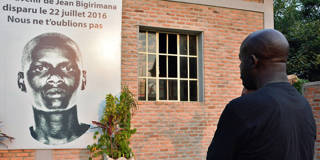President Évariste Ndayishimiye's efforts to signal a more media-friendly environment do not amount to a clean break with Burundi’s recent history of media repression. The government should unconditionally lift all media bans, overturn convictions of exiled journalists, and overhaul laws that restrict the journalists' work.
NAIROBI – Jean Bigirimana, a reporter with the independent Burundian news outlet Iwacu, promised to be back soon when he left his home around lunchtime on July 22, 2016, after receiving a call from a source in the country’s intelligence service. That was the last time his wife, Godeberthe Hakizimana, saw him.
For Iwacu chief editor Abbas Mbazumutima, the days that followed were “cold” and “inexplicable” as he led a team of reporters who – after a tepid response from the authorities – took matters into their own hands by searching for Bigirimana. Five years later, questions about Bigirimana’s fate linger.
The episode is emblematic of Burundi’s difficult environment for journalists, amid largely unfulfilled promises of reform by President Évariste Ndayishimiye. “The first thing you see when you open the Iwacu gate [in Bujumbura] is a big poster of Jean,” Mbazumutima, who recruited Bigirimana to Iwacu, told me. “It reminds you of many things. It reminds you that the work you are doing is a dangerous job, not an easy job.”

NAIROBI – Jean Bigirimana, a reporter with the independent Burundian news outlet Iwacu, promised to be back soon when he left his home around lunchtime on July 22, 2016, after receiving a call from a source in the country’s intelligence service. That was the last time his wife, Godeberthe Hakizimana, saw him.
For Iwacu chief editor Abbas Mbazumutima, the days that followed were “cold” and “inexplicable” as he led a team of reporters who – after a tepid response from the authorities – took matters into their own hands by searching for Bigirimana. Five years later, questions about Bigirimana’s fate linger.
The episode is emblematic of Burundi’s difficult environment for journalists, amid largely unfulfilled promises of reform by President Évariste Ndayishimiye. “The first thing you see when you open the Iwacu gate [in Bujumbura] is a big poster of Jean,” Mbazumutima, who recruited Bigirimana to Iwacu, told me. “It reminds you of many things. It reminds you that the work you are doing is a dangerous job, not an easy job.”